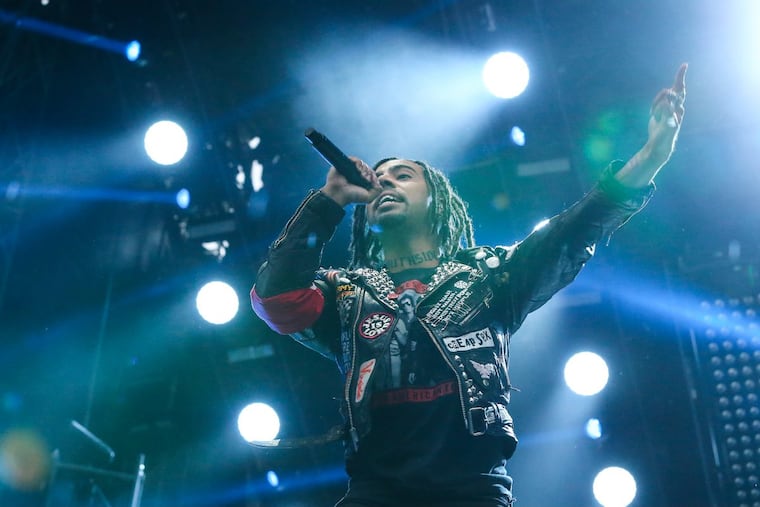Rapper Vic Mensa: 'The Meek Mill situation is a classic picture of America's need for dominance over its blacks'
Vic Mensa opens for Jay Z at the Wells Fargo Center Friday.

Before 2017 — before the release of his song "Homewrecker," his debut full-length The Autobiography, a winning spot during Made in America, an affiliation with Jay Z's Roc Nation — Vic Mensa was a conscious, amiable, but admittedly druggy rapper-writer better known for his affiliations with fellow Chicagoans Chance the Rapper and Kanye West than his own material. But this year, Mensa sobered up, radically refocused, and rededicated himself to the sociopolitical storytelling that drove him to hip-hop in the first place. That's made him a wildly, warmly incendiary artist, and landed him an opening spot for Jay Z at his Friday show at the Wells Fargo Center.
The last time you were in Philly with Made in America, you made quite an impact despite messy production values. What’s your recollection of the day?
That's funny because, man, we were having some real technical difficulties. The rain got into my equipment. The way the human mind works though, something goes wrong and you find focus. MIA was an ill crowd and a great lineup, spanning a lot of different genres. Little Dragon I loved and they spoke to a certain constituency different from Meek Mill, who came out with Jay Z, or Cardi B, or me.
» READ MORE: especially since Jay is helping to pay for ‘Free Meek’ billboards and lit-up buses
I haven't spoken to Hov [Jay Z] about this, but those of us in the black community watching our friends, brothers, fathers, and uncles shipped off to these modern-day plantations have an understanding about that: This is slavery again. We understand it all too well. Somebody's making a dollar off all this, for what goes with slavery is slave labor used to make your favorite products — like Starbucks lids for your frothy latte. The Meek Mill situation is a classic picture of America's need for dominance over its blacks, specifically its young men. What's worse is that the mentality of neo-Colonialism is sneaking into the colonized.
Because of the judge?
The woman who insisted on sending Meek to prison is a black woman. That's where things get interesting, where people from the community that is being exploited have been so indoctrinated into racist American ideology, that they carry it out all on their own.
You’ve mentioned your struggles with drugs, depression, and suicidal thoughts: Do you think it took bottoming out to get your head around writing in a sociopolitical fashion, or do you think you were always issues-oriented, but simply recorded as a young man with a young man’s wants?
Both actually. I have always been politically minded, even if it didn't come out with the same force as on The Autobiography. I got a Black Panther tattoo on my shoulder when I was 16. My first mixtape that same year had to do, lyrically in retrospect, with what is going on with the NFL and Colin Kaepernick — another form of exploitation of black men. But I did lose direction, lose some purpose, being caught so deeply in drugs. I didn't feel that I had a responsibility to use my vice for anything. I hit a wall with that mentality, that lifestyle, and finally redirected myself to where I started. I idolized guys like Common and Nas, people talking about issues. That was my home, musically. Hitting rock bottom forced me to evaluate — pushed me back home.
You mentioned Common. Like him, you have turned Chicago into something like a character in a novel.
I wanted to depict Chicago in an honest light. I wasn't trying to feed into stereotypes. I wanted reality. There's a song in there, "Heaven on Earth," where I display empathy, make people look at the victims and the perpetrators of rampant gun violence there as human beings. The people behind and in front of the guns aren't different people, but that is how they're portrayed.
For you, they’re more than statistics.
Exactly. They're brothers and sisters. They're one in the same. The situations that can turn someone into a killer or a dead man can be very subjective. A day can take a turn and you can go from being a shooter to being shot, from being a peaceful man to being a killer. I wanted to make listeners realize that everyone suffers in this scenario, that there are no mindless zombies doing the killing against frightened civilians. It is an entire community in turmoil. I want people to look at Chicago through an emotional lens.
So there’s not just the dead and dying. Look at your own life.
I know. I was a little rocker kid hanging with Weezer samples. I come from a place of culture, influence, style, and struggle all at once, and not a city where people get off the plane and have bullets soaring over your head.